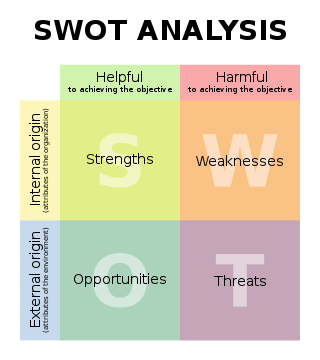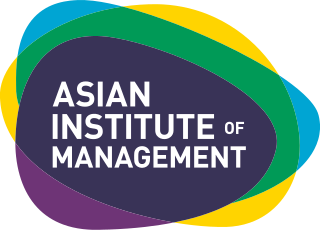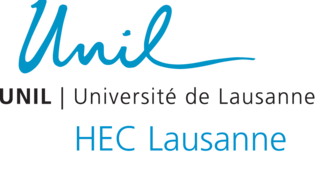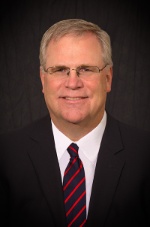Business administration is the administration of a commercial enterprise. It includes all aspects of overseeing and supervising the business operations of an organization.

In strategic planning and strategic management, SWOT analysis is a decision-making technique that identifies the strengths, weaknesses, opportunities, and threats of an organization or project.

Michael Eugene Porter is an American businessman and professor at Harvard Business School. He was one of the founders of the consulting firm The Monitor Group and FSG, a social impact consultancy. He is credited with creating Porter's five forces analysis, which is instrumental in business strategy development at present. He is generally regarded as the father of the modern strategy field. He is also regarded as one of the world's most influential thinkers on management and competitiveness as well as one of the most influential business strategists. His work has been recognized by governments, non-governmental organizations and universities.
The Doctor of Business Administration (DBA) or (DrBA) is a terminal degree in business administration. The DBA is classified as a research doctorate or professional doctorate depending on the granting university and country where the degree was awarded. Academically, the DBA is awarded based on advanced study, examinations, project work, and advanced research in the field of business administration.
Human resource management (HRM) is the strategic and coherent approach to the effective and efficient management of people in a company or organization such that they help their business gain a competitive advantage. It is designed to maximize employee performance in service of an employer's strategic objectives. Human resource management is primarily concerned with the management of people within organizations, focusing on policies and systems. HR departments are responsible for overseeing employee-benefits design, employee recruitment, training and development, performance appraisal, and reward management, such as managing pay and employee benefits systems. HR also concerns itself with organizational change and industrial relations, or the balancing of organizational practices with requirements arising from collective bargaining and governmental laws.

The Asian Institute of Management (AIM) is a management school and research institution in Makati, the Philippines. Established in partnership with Harvard Business School, it is one of the few business schools in Asia to be internationally accredited with the Association to Advance Collegiate Schools of Business (AACSB). Stephen H. Fuller of the Harvard Business School was its first president. It was described by Asiaweek magazine as the best in the Asia-Pacific region in terms of executive education.
An information professional or information specialist is someone who collects, records, organises, stores, preserves, retrieves, and disseminates printed or digital information. The service delivered to the client is known as an information service.
Commercial intelligence (CI) is the process of defining, gathering, analyzing, distributing accurate, and relevant intelligence regarding the products, customers, competitors, business environment, and the organization itself. This methodical program affects the organization's tactics, decisions and operations. It is a form of open-source intelligence practiced by diverse international and local businesses.
The Ridge College of Intelligence Studies and Applied Sciences at Mercyhurst University (RIAP), located on the campus of Mercyhurst University in Erie, Pennsylvania, offers undergraduate and graduate studies programs in intelligence analysis. The program also offers graduate certificates in Applied Intelligence, Counterintelligence, and Law Enforcement Intelligence. The Intelligence Studies program "promotes the study of Intelligence in higher academic settings, while seeking to identify, promote, and employ best practices in the study and application of intelligence studies throughout its various disciplines (national security, law enforcement, business intelligence and academia)."

The Gubkin Russian State University of Oil and Gas is a public university in Moscow, Russia. The university was founded in 1930 and is named after the geologist Ivan Gubkin. The university is colloquially known as Kerosinka, meaning 'kerosene stove'.
Babette Bensoussan is an author and competitive intelligence specialist, who has written several books on competitive intelligence and analysis. She runs a consulting firm based in Sydney, Australia, The MindShifts Group Pty. Ltd. Babette now lives with her husband on the Sunshine Coast in Queensland, Australia.
Craig S. Fleisher is a scholar, advisor and author who has written or edited several books on public affairs, business, and competitive intelligence and analysis. Before becoming Dean of the Business School at the College of Coastal Georgia, he was awarded two endowed research chair positions while a Professor of Business at the Odette School of Business, University of Windsor, Ontario, Canada. His research addresses the areas of business and competitive intelligence, corporate public affairs, and performance management and measurement. Since 2011 Dr. Fleisher has served as the Chief Learning Officer of Aurora WDC, a 20+ year old professional services firm (PSF) headquartered in Madison, Wisconsin, USA.

HEC Lausanne, also called the Faculty of Business and Economics of the University of Lausanne, is the affiliated business school of the University of Lausanne. Since 1911, HEC Lausanne has been developing teaching and research in the field of business and economics. HEC Lausanne offers Bachelor’s, Master’s, and PhD degrees, as well as executive education, professional certification, and professional development programs, including a part-time Executive MBA, short, open courses, and tailor-made programs for organizations.
Benjamin Gilad is an author, consultant, and teacher in the field of competitive intelligence. He is a co-founder of the Fuld-Gilad-Herring Academy of Competitive Intelligence. He was educated in psychology and philosophy at Tel Aviv University. After moving to the United States he studied business at Central Missouri State University, and later obtained a PhD from New York University. He is the author of The Business Intelligence System, Business Blind Sports, Early Warning, Business War games, and articles related to the field of competitive intelligence.
Porter's four corners model is a predictive tool designed by Michael Porter that helps in determining a competitor's course of action. Unlike other predictive models which predominantly rely on a firm's current strategy and capabilities to determine future strategy, Porter's model additionally calls for an understanding of what motivates the competitor. This added dimension of understanding a competitor's internal culture, value system, mindset, and assumptions helps in determining a much more accurate and realistic reading of a competitor's possible reactions in a given situation.
Yves-Michel Marti is a pioneer in the field of Competitive Intelligence. He is the founder of Egideria and of the French branch of the Society of Competitive Intelligence Professionals.
The Global Intelligence Forum is an annual conference dedicated to exploring best practices in intelligence analysis. The conference takes place in Dungarvan, Ireland, the sister city of Erie, Pennsylvania, home of Mercyhurst College, the Mercyhurst College Institute for Intelligence Studies, and the Center for Intelligence Research Analysis and Training (CIRAT).
Christopher A. Bartlett is an Australian organizational theorist, and Emeritus Professor of Business Administration at the Harvard Business School, known for his work on multinational corporation and transnational management with Sumantra Ghoshal.

Jay B. Barney is an American professor in strategic management at the University of Utah.





